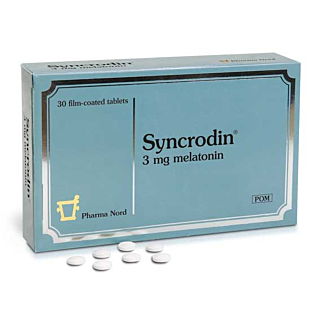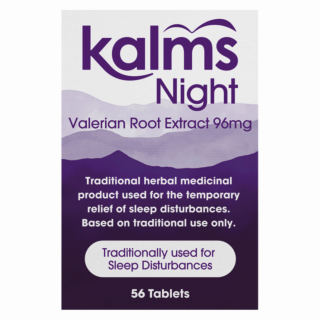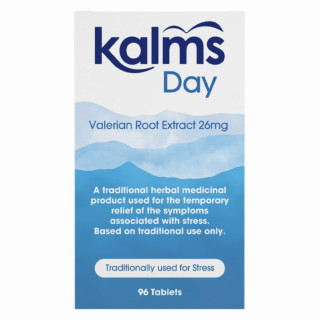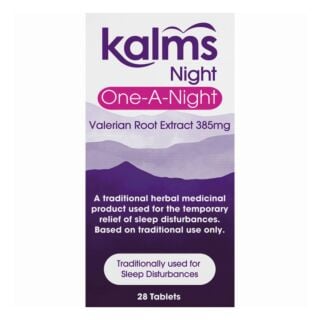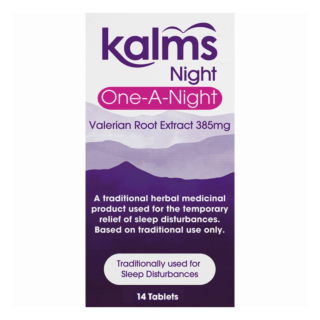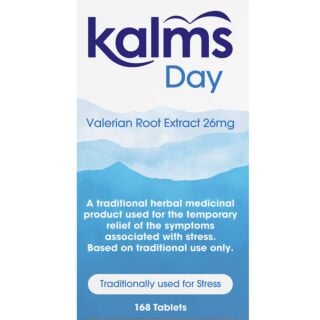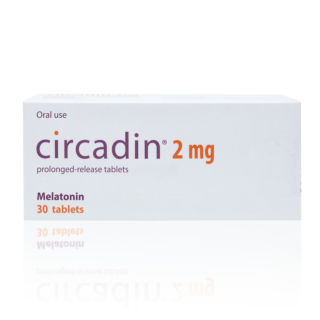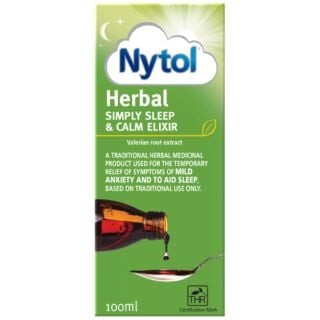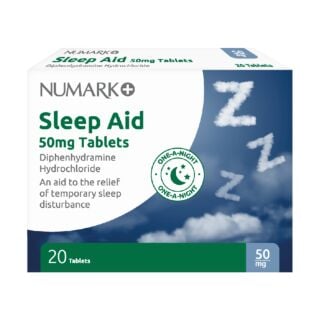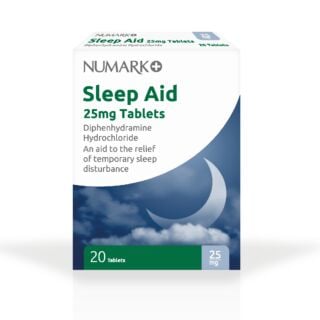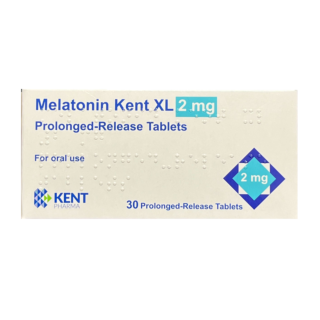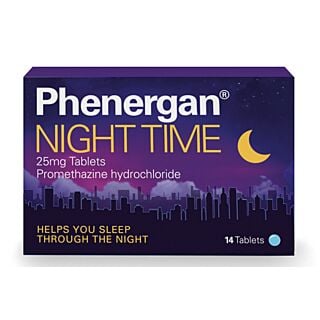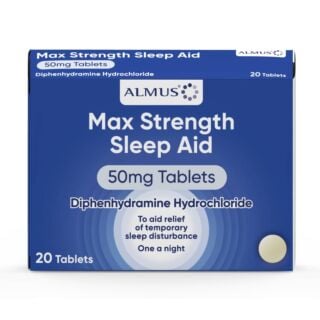Insomnia
The impact of insomnia on peoples’ lives and wellbeing cannot be understated. Whether you experience insomnia from time to time or have struggled to sleep for as long as you can remember, you need to sleep.1 … Read More See less
Sleep is a reduced state of consciousness that all humans and most non-human animals experience.2 It is thought to support your ability to learn and remember and helps to cleanse your brain cells of the waste chemicals and proteins that build up inside them.2 A lack of sleep can therefore cause sleep deprivation, which can impact your daily functioning and mental health.1
Whatever the reason for your insomnia, you deserve to understand how you can overcome it using lifestyle changes, non-prescribed sleeping pills and prescribed sleeping tablets in the UK.
What is insomnia?
Insomnia is a difficulty to get to sleep, get enough sleep, stay asleep, or sleep well.1,3 This occurs despite having the opportunity to get enough sleep and impairs your ability to function during the day.3 However, if an inability to sleep does not impair your daytime functioning, it is not considered to be insomnia.3
If your symptoms occur for less than three months (a few days or weeks), you have short-term (acute) insomnia.1,3,4 If you have insomnia for at least three nights per week for three months or more, you have chronic insomnia.1,3,4
Insomnia can manifest as:1
- Difficulty falling asleep (sleep onset insomnia)
- Waking up in the middle of the night (maintenance insomnia)
- Waking up too early and not falling back to sleep (early waking insomnia)
Maintenance insomnia is the most common form of the condition.1
Insomnia affects around a third of adults in Western countries.5 6–10% of these fulfil the criteria for chronic insomnia.5 Anyone can experience insomnia, but it occurs 1.5–2 times more frequently in females than males. According to our latest menopause statistics report, difficulty sleeping is reported by 25% of women in perimenopause. It increases with age and occurs most often in older adults.
How many hours of sleep do I need?
You may have heard that you need eight hours of sleep a night, but the amount of sleep each person needs is highly individual.2
The idea of eight hours a night is prevalent because most adults need between seven and eight hours to function well.2,4 But some people can function well on four to five hours of sleep and others may need more like nine hours.2,4 However, children tend to need between nine and 13 hours of sleep and toddlers and babies need between 12 and 17 hours.4 The amount of sleep we each need tends to reduce as we age.2
What matters overall, however, is whether you feel you’re getting enough sleep and whether the sleep you’re getting is high quality.2,6
Insomnia symptoms
You have insomnia if you regularly:1,4
- Have difficulty falling asleep
- Struggle to stay asleep
- Wake up early and cannot go back to sleep
- Feel tired during the day
- Experience delayed reactions
- Have trouble remembering things
- Have trouble concentrating
- Feel irritable, anxious or depressed
- Find it hard to nap during the day, even though you're tired
Your insomnia shouldn’t be caused by medications or other sleep disorders, medical or mental health conditions.
Complications of insomnia
Severe insomnia or chronic insomnia can cause sleep deprivation.1 Sleep deprivation can make you extremely sleepy during the day, which can be dangerous if you’re doing tasks that require high levels of concentration, such as driving.1 Additionally, it can cause you to take more days off work than other people.7
Sleep deprivation can also increase your risk of:1,7
- Depression
- Anxiety
- Substance misuse
- High blood pressure (hypertension)
- Heart attack
- Stroke
- Obstructive sleep apnoea
- Type 2 diabetes
- Obesity
- Psychosis
Causes of insomnia
People with insomnia may have more active brains or brain chemistry differences that affect their ability to sleep.1
However, a number of other factors can contribute to insomnia, such as:1,4,6
- Having a family history of insomnia
- Medical conditions, like acid reflux or parkinson’s disease
- Mental health conditions, like anxiety and depression
- Going through stressful circumstances
- Doing shift work
- Having poor sleep hygiene (e.g. Drinking caffeine late into the evening, taking naps during the day and going to sleep at different times each night)
- Sleeping in a room that’s too hot or too cold
- Noises that keep you awake
- Using drugs like caffeine, nicotine, cocaine or ecstasy
- Having an uncomfortable bed
How to treat insomnia
You may be able to treat your insomnia yourself by improving your sleep hygiene and with over the counter (OTC) sleep drugs.4,6,8 However, if these approaches don’t work, you should make an appointment with your GP.4
Depending on the cause of your insomnia and how severe it is, your GP may prescribe medication, or a course of cognitive behavioural therapy specifically designed for insomnia (CBTi).4,6,8
How to improve your sleep hygiene
Changing your sleep habits can improve your insomnia:4,6
- Go to bed at the same time every day
- Get up at the same time every day, even if you don’t feel like you’ve had enough sleep
- Do not nap during the day
- Make sure your bedroom is dark and quiet – use thick blinds or curtains and an eye mask or ear plugs
- Keep your bedroom slightly cooler than the rest of your living area
- Get regular exercise, but don’t exercise for at least four hours before going to bed
- Make sure your mattress, covers and pillow are comfortable
- Relax for at least an hour before bed (e.g., take a bath, read a book or listen to gentle music)
- Write any worries and ideas down before going to bed, so that you can mentally put them to the side until morning
- Avoid caffeine, alcohol and smoking for a few hours before bed
- Don’t eat a big meal just before bedtime
- Avoid watching television or using a smartphone right before bed, as the blue light can make you feel more awake
- Don’t eat a big meal just before bedtime
- Try not to use your bedroom for anything other than sleeping or sex
Medicine for sleep over the counter
OTC tablets or liquids from a pharmacy may help you to overcome an acute bout of insomnia.4,6,9 The best sleeping tablets contain ingredients, such as:1,4,6,9–11
- Antihistamines – drowsy antihistamines, such as doxylamine, diphenhydramine and promethazine, can help you fall asleep. However, you should only use medications that contain drowsy antihistamines for short periods, as you can develop a tolerance to their sedative effects
- Lavender – some research has identified the beneficial effects of lavender on both the quality and duration of sleep
- Valerian – limited research has demonstrated that valerian may reduce the amount of time it takes to get to sleep and improve sleep quality
- Melatonin – melatonin is a hormone that helps to regulate your sleep-wake cycle. Supplementing with melatonin tablets has been found to help treat jet lag and reduce the amount of time it takes to fall asleep
Cognitive behavioural therapy
If changing your sleep habits and using OTC sleep drugs doesn’t improve your insomnia, you may be offered CBTi.4,6,8 This includes behavioural interventions (e.g. stimulus control and sleep restriction), cognitive therapy, and relaxation training.8 The aim is to change the unhelpful thoughts and behaviours that contribute to your insomnia.6
CBTi has been found to be an effective treatment for many people and the results can be long term.6
Prescription sleeping pills
You will only be prescribed sleeping pills in very severe cases, and only for short term use (preferably less than one week).4,8 This is because they can have serious side effects and you can become dependent on them.4
Prescription sleeping pills in the UK include:1,8,12–15
- Benzodiazepines – a group of depressant medication that slow down the central nervous system. Benzodiazepines prescribed in the uk include diazepam (valium)
- Zopiclone and temazepam –sleeping pills that increase the calming chemical in your brain (gaba) to help you fall asleep and prevent you from waking up during the night
- Prolonged release melatonin – you can get slow-release melatonin tablets on prescription, which release melatonin gradually into your body overnight to help you sleep
How to fall asleep when you’re struggling
According to the NHS, if you can’t fall asleep and this is making you anxious, you should:
- Get up
- Move to a different room
- Do something relaxing, like reading or listening to music
- Try going to sleep again in around 20 minutes, or whenever you feel tired again
Sources
- https://my.clevelandclinic.org/health/diseases/12119-insomnia
- https://royalpapworth.nhs.uk/application/files/5316/4640/2088/PI_215_How_to_tackle_insomnia_V2_online.pdf
- https://cks.nice.org.uk/topics/insomnia/background-information/definition/
- https://www.nhs.uk/conditions/insomnia/
- https://cks.nice.org.uk/topics/insomnia/background-information/prevalence/
- https://www.nhsinform.scot/illnesses-and-conditions/mental-health/insomnia/
- https://cks.nice.org.uk/topics/insomnia/background-information/complications/
- https://cks.nice.org.uk/topics/insomnia/management/managing-insomnia/
- https://www.mayoclinic.org/healthy-lifestyle/adult-health/in-depth/sleep-aids/art-20047860
- https://pmc.ncbi.nlm.nih.gov/articles/PMC3612440/
- https://www.mayoclinic.org/diseases-conditions/insomnia/expert-answers/valerian/faq-20057875
- https://www.nhsinform.scot/healthy-living/drugs-and-drug-use/common-drugs/benzodiazepines-benzos-diazepam-valium/
- https://www.nhs.uk/medicines/zopiclone/about-zopiclone/
- https://www.nhs.uk/medicines/temazepam/about-temazepam/
- https://www.nhs.uk/medicines/melatonin/how-and-when-to-take-melatonin/

Free delivery when you spend over £30

100% discreet delivery for every item ordered

Fully regulated UK pharmacy
What is insomnia?
When you have insomnia it means that you struggle to fall asleep or stay asleep at night.
You may wake up several times in the night and find yourself lying awake staring at the ceiling wondering why you can’t just get some sleep.
When you’re suffering from insomnia it can make you feel tired and irritated, and you may find it more difficult to concentrate on your work or other things you may be doing during the day.
Why do I have insomnia?
Lots of people suffer from insomnia at some point in their lives, and it can happen for lots of different reasons.
Some of the most common reasons why people struggle to fall asleep at night include:
- Stress, worry, anxiety, or depression
- Poor sleep hygiene, e.g. an inconsistent sleep schedule
- Sleeping in a noisy room
- Your room is too bright
- Your room is too hot or too cold
- Shift work
- Jet lag
- Caffeinated drinks, such as coffee or energy drinks
- Alcohol
- Nicotine
- Taking recreational drugs, e.g. cocaine, ecstasy
What are the best sleeping pills?
It can be frustrating when you can’t sleep - tossing, turning, and becoming stressed about how much sleep you can get before that dreaded alarm clock sound.
Sleeping medication can come in the form of herbal remedies and over-the-counter medicines.
Herbal treatments include valerian root, hops, and passionflower, which work by providing a natural sedative by relieving feelings of anxiety and restlessness.
Over-the-counter treatments may include the active ingredients diphenhydramine and promethazine, found in Phenergan, Nytol, and Sominex.
There are also a range of prescription-strength sleeping pills such as Z-drugs and benzodiazepines if other remedies haven’t relieved your insomnia.
What are the best supplements for sleep?
Magnesium helps your body to produce the sleep hormone melatonin and it may also relieve tense muscles to promote restful sleep.
Some studies suggest that people with low levels of vitamins C and D had an increase in sleep problems, and were prone to waking up during the night.
Why is sleep important?
Having the odd night of inadequate sleep can make you feel tired and a little cranky, but it won’t have a serious impact on your overall health.
However, regularly not achieving a decent amount of sleep can have a huge effect on your health and put you at risk of developing severe medical conditions, as well as having a negative influence on your body, thoughts, emotions and behaviour.
For most people, it is recommended to achieve at least eight hours of good quality sleep to allow us to function at our best, with the importance placed more on the quality rather than the hours of sleep.
If you are waking up tired and spending the day feeling sleepy, chances are you’re not getting the correct amount or a decent quality of sleep which, over time, can have serious implications including:
- Increased risk of serious medical conditions such as heart disease and diabetes – it can even take time off our life expectancy
- Mental health problems such as anxiety and depression
- Weight gain due to lower levels of leptin (the chemical that makes us feel full) and higher levels of ghrelin (the hormone that stimulates hunger).
Just goes to show, waking up on the wrong side of the bed can cause more issues than a grumpy mood!














